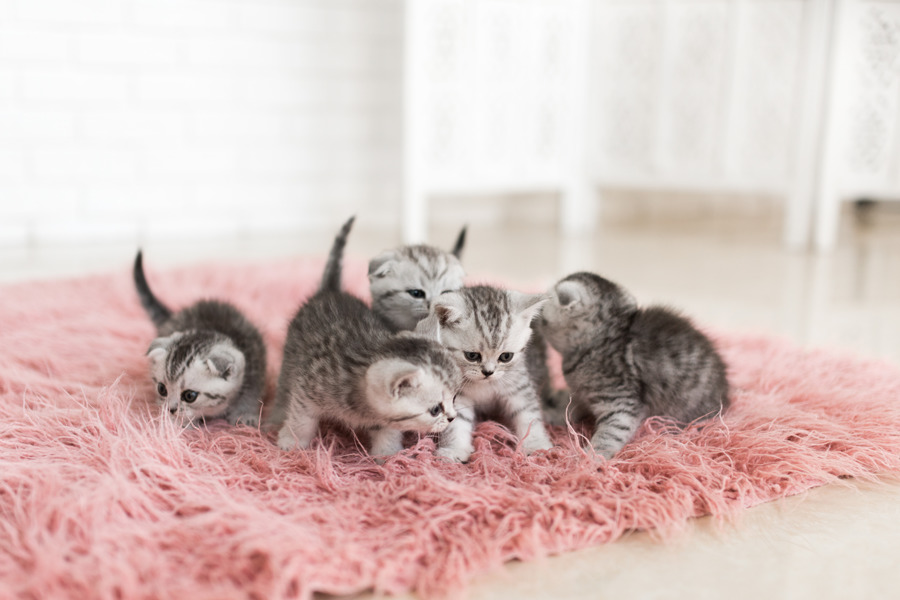Kittens are among the most adorable creatures on God’s earth. They are easy to fall in love with, and they are pretty easy to take care of if you follow a few common-sense rules.
Our New Kitten Checklist is designed to help you prepare for your new responsibilities and ensure that having a kitten is exactly as much fun and joy as you hoped it would be.
The Ultimate New Kitten Checklist
- Before you get your kitten, please, please, please, consider getting a kitten from an animal shelter. Rescued kittens are every bit as gorgeous as pedigree animals, they may well be more robust thorough their life, and they come with a health check and, if old enough, they will be neutered.
- Find a good local vet who you can call in case of an emergency and who will give your kitten its routine shots.
Kitten-proof your home. Make sure windows are not open, or if they are, they should be screened. (Remember that kittens are amazing athletes and can climb up high.) Tidy away cable, make sure cupboards can’t be easily opened – it’s almost like having a toddler. - Decide where your kitten will sleep. If you need to leave your kitten alone for long periods, consider providing your kitty with a large crate that contains a snug bed, a litter tray, water, a little food, and some toys. This will become your kitten’s retreat place. Make sure that a tiny kitten can’t slip through the bars.
- Make sure that your kitten’s litter tray has low enough sides for your kitty to step over. Don’t buy clumping litter, as kittens can have problems if they eat this by mistake. Instead, you’ll need to buy litter and a scoop for easy disposal.
- Buy food and drink dishes that are easy to clean and cute.
- Get a collar and id tag for your kitten. Even indoor cats might escape. Make sure it will stretch or break if your kitten gets snagged up on something.
- Find out what your kitten has been eating, if possible, and get in a small food supply. You may decide to change the kitten’s food; if you do, make the change gradually, combining a little more of the new food with the old food each day.
- Kitten treats. These little goodies are great to help with training and bonding.
- Cat scratching poles. All cats need to scratch, and if you want to preserve your furniture, offering your kitten a scratching pole to exercise her claws on is a great idea. You can buy these in most pet stores or look online for ideas for making one of your own.
- Toys. Kittens love to play, and a crumpled-up ball of paper or a piece of string makes a good toy. But of course, it’s great fun to see your kitty playing with something new and cute, so browse the pet stores for kitten-friendly play objects.
- A cat carrier. Invest in a cat carrier, and allow your kitten to get used to it, and you will never have issues when you need to transport your pet to the vet or when traveling. It’s a good idea to get one bigger than you need right now to allow for when your kitten becomes a fully grown cat.
- A catio. This is a patio for cats. If you can, create a safe enclosed area for your cat to allow her to get some fresh air and sunshine. Make sure it’s escape-proof and easy to clean.
- Cleaning materials. Although cats are very clean and quick to learn about their litter tray, it’s a good idea to have some pet-specific cleaning materials on hand to deal with any little accidents.
Some FAQs For New Kitten Owners
Start as you mean to go on. Let your kitten spend time on her bed, leave her one or two treats, and make sure she is warm and protected from drafts. If she has just come from a litter of kittens and her mom, she will very likely feel sad. Try wrapping an old-fashioned ticking clock and a hot water bottle in a thick towel underneath her. This can be very reassuring.
Kitties get used to their new home remarkably quickly, especially if you are nice and calm and pay attention to making her feel comfortable. Food is a great tool, give your kitten frequent tiny meals, and she will soon feel at home.
This rather depends on how house-proud you are, as there could be accidents in the early day – of the pee and poop kind. It’s probably best to confine your kitten to one or two rooms to start with.
Honestly, it’s not really hygienic to have animals sleep with you. Let your kitten get used to his or her own bed until you think about allowing your pet to join you on your bed. Our honest report on this? We allow our pets, including kittens, to sleep on our bed if it’s very cold or if there is bad weather such as high winds or a thunderstorm which can be scary.
Yes, of course, especially if your kitten is safe in its crate.
Cats don’t need a light on at night; they have good night vision. A little night light might be useful for an especially timid kitten, but in general, it’s not needed.
You might hear some crying on the first night. Check to make sure your kitten is warm and cozy, and yes, ignore it unless your pet sounds very anguished.
Yes, they can find their litter box by smell if not by sight. Just about all kittens learn to use their litter box really quickly and much prefer to use their box than to go anywhere else.
Kittens are very easy to look after, and you should not hesitate to bring one of these dear little creatures into your life. Remember, though, at all times, that your kitten is an animal and not a fluffy toy. Cats are not like dogs, they can be aloof at times, but they will reward your love and care with their own special ways of showing affection. Get ready to post those kitty videos online!








